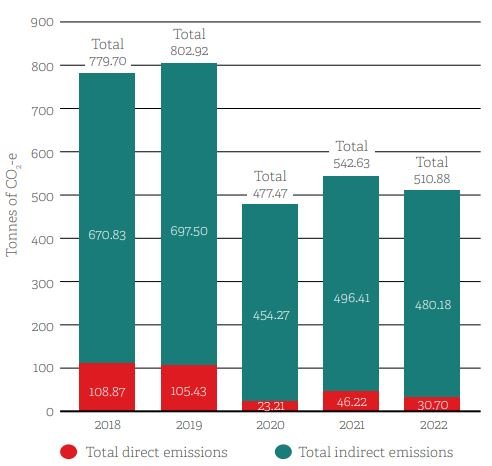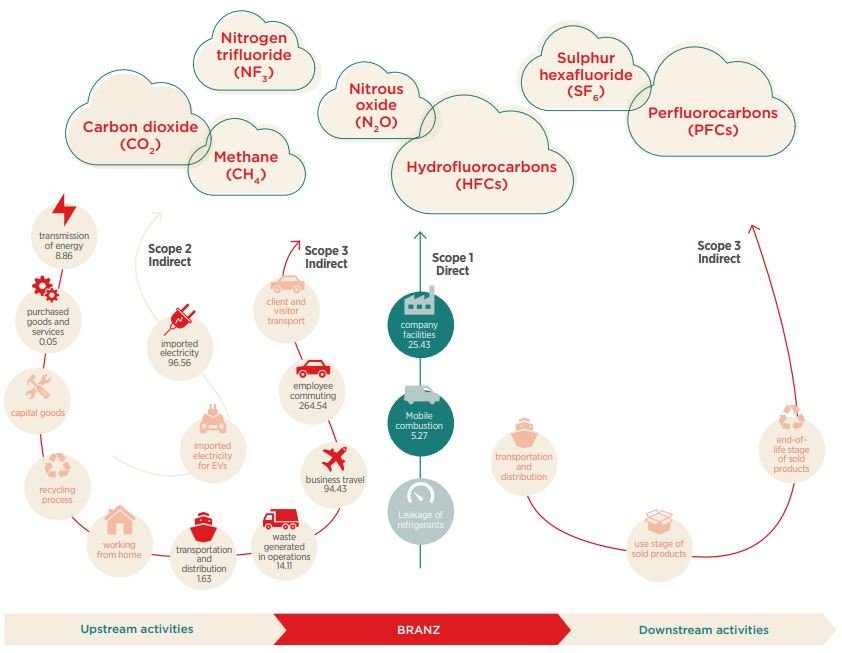We are committed to increasing our understanding of the environmental impact of the way we work at BRANZ, and taking decisive action to improve, limit or reduce that impact wherever possible. Our objective is to achieve this without decreasing our efficacy as an organisation. BRANZ’s aim is to become a net-zero emissions business by 2035 or before.
We have taken a clear industry leadership position regarding environmental and sustainability measures and adopted an approach of continuous improvement that is ahead of regulation.
In 2021 BRANZ joined the Toitū net carbonzero certification programme and were Net Carbon Zero certified by Toitū in April 2022. Our recertification is due in 2025, with annual checks scheduled in March 2023 and 2024.
BRANZ’s carbon footprint for the years 2017, 2018, 2019, 2020, 2021 and 2022 was independently verified by Toitū, and carbon credits were purchased to offset emissions.


Reducing our emissions
Our aim is to decarbonise BRANZ’s activities wherever possible while remaining operationally effective. This is not just about compliance. Rather, it underpins our vision, which is effectively about actively driving positive change for our organisation, our wider community and the planet.
At present, BRANZ:
- has developed an emissions reduction plan that will be reported against annually.
- is data mining our existing carbon footprint data to identify actions to expand our existing decarbonisation efforts.
- is planning a retrospective review of an initial emissions impact study of our campus development building programme.
Sustainability snapshot
Our formal approach to sustainability is evolving over time. Two prominent themes are an emerging focus:
- Rebalancing our environmental management and sustainability efforts.
- Refreshing the alignment of thought and action from governance through to operations and onto our clients.
Key actions undertaken include:
- continuing to expand our electric vehicle fleet and charging arrangements
- incorporating sustainable design elements into campus redevelopment initiatives
- avoiding landfill use by ensuring appropriate recycling or reuse options are available
- continuing to eliminate use of non-renewable, non-recyclable and non-reusable materials
- using environmentally friendly products wherever possible
- utilising more recyclable packaging options in our on-site café
- ensuring full transparency of our sustainability activity, plans and performance in our 2021, 2022 and 2023 Annual Review and on our website.
- Preparing to report on full value chain emissions by August 2026.
Supporting the building and construction industry
BRANZ has been researching aspects of climate change for more than 20 years and using that science to guide and support climate change action within the sector. Our efforts have included working closely with the Construction Sector Accord during its first three-year plan on developing a programme of work for its Environment workstream.
We also continued to undertake carbon-zero and energy efficiency research that will drive necessary change.
In 2020 BRANZ launched the national research programme Transitioning to a zero-carbon built environment which coordinates solutions. We’re also working on an expanding suite of tools and information resources for sector use:
- CO₂NSTRUCT provides embodied carbon and energy values for building materials, including concrete, glass, timber and metals, as well as products such as lifts and fittings for bathrooms and kitchens.
- LCAQuick helps building practitioners assess the environmental impact of a building over its life cycle.
- CO₂RE – compares the impact and R-values of common residential constructions
- CO₂MPARE – provides summary carbon footprint and other data and information about reference residential and office buildings.
- LCAPlay – compares the impact of different building forms, structural systems, façade and HVAC systems in commercial buildings.
BRANZ bulletins on the topic include:
- BU596 An introduction to life cycle assessment
- BU608 Building life cycle assessment
- BU651 Climate change, net-zero carbon and the building industry
- BU655 Building blocks for new-build net-zero carbon houses
- BU669 Tools for measuring carbon in new-build houses
- BU679 Introduction to calculating whole-of-life carbon footprints of houses
BRANZ fact sheets on the topic include:
- Zero-carbon built environment #1: A carbon budget for New Zealand houses
- Zero carbon built environment #2: Usage and uptake of engineered wood products in New Zealand
- Zero carbon built environment #3: Increasing the use of supplementary cementitious materials (SCMs) in concrete production in New Zealand
- Zero carbon #4: Towards a consistent approach for evaluating building performance for low-carbon houses
The most important role BRANZ plays is ensuring the sector has access to our resources, science, experience and networks to help it achieve national carbon budget goals.
Our journey towards a more sustainable future
BRANZ’s journey towards sustainability began with an on-site cardboard recycling cage and the use of vegetable printing inks for Build magazine. Read more about how we took small and big steps towards a more sustainable future.